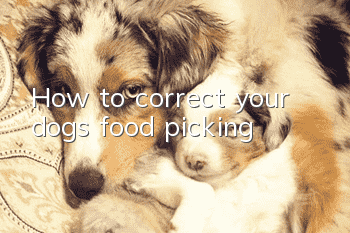Feeding of 2-month-old puppies

Dogs that are two months old are the most difficult to take care of. Dogs that are two months old are generally just weaned, and they still have many picky and restrictive diets. The teeth in the mouths of young puppies have not yet fully grown, and their gastrointestinal functions are extremely fragile. Owners must pay special attention when choosing food for their puppies. Want to know how to feed a two-month-old dog?
1. Food: For puppies that have just been brought home, it is necessary to understand the type, amount and feeding time of the food given by the original owner. Try to keep it the same as the previous owner. After a week, slowly change the eating habits. . Otherwise, a series of drastic changes such as changing eating habits, changing the environment, changing to a new owner, or long-distance transportation from other places will cause a strong stress response in the dog's body, resulting in a decrease in the dog's resistance. Gastrointestinal dysfunction can easily cause disease.
In addition, it is also necessary to consider that the gastrointestinal digestion ability of puppies is weak, and the food should contain less fiber and should be soft and easy to digest. Some families give them large amounts of meat out of pampering. Gastrointestinal dysfunction will occur after 1 to 2 days. Generally within 3 to 4 months, it is appropriate to eat porridge-like food or dry food soaked in water. Some other foods often cause indigestion, diarrhea, etc. Dogs eating milk can also easily cause diarrhea. The protein content of dog mother's milk is high, which is 3 times that of cow's milk and 7.5 times that of human milk. It is a kind of milk with high protein, high fat and low lactose, while cow's milk and milk powder used by humans are low in protein, low fat and low lactose. The substances in high-lactose milk are different from those in dog milk. Insufficient lactose-digesting enzymes in the dog's intestines (genetic factors). If the milk (or food) fed to the puppies contains a large amount of high sugar, it often causes fermentation in the intestines and causes diarrhea. Therefore, 2-month-old puppies should be fed high-protein food plus vegetables (equivalent to food for 4 to 5-month-old babies). For example, give chicken breast or beef with less fat, add a small amount of vegetables, cut them into thin strips, add some bread crumbs or rice and mix well. Feed 3 to 4 times a day. Add some calcium powder (or bone meal, active calcium, etc.) to the food appropriately, and add 1 to 2 drops of vitamin A and D liquid to meet the needs of bone growth and development.
2. Excretion: Pay attention to whether the urine and feces are normal. The frequency of bowel movements varies with age. Several times a day when 1 month old, and about 3 times a day when 2 months old. The frequency of bowel movements is related to the type of food. For example, when meat is added to rice, the amount and frequency of stools will be less. When more starchy foods are fed, the frequency and amount will be greater. Also pay attention to the color, smell, or presence of worms in the dog's stool. Normal stool is strip-shaped, moderately soft and hard, and usually slightly yellow. But it is also affected by food. For example, if there is too much meat or some liver is added, the feces will turn black. Frequency of urination also changes with age. When 1 month old, it is about once every 2 hours, and when 2 months old, it is about 5 to 6 times a day. Urine that is light yellow or clear and transparent is considered healthy. Generally, the color of urine for the first time in the morning may be slightly thicker. If the urine color remains thick, it may be a sign of illness and you should go to the animal hospital for examination.
3, Education: Education on good habits should be carried out from 2 months onwards. At this time, first name the canine, call her name frequently, let her know that you are calling her, and establish a conditioned reflex to make her come immediately. Another name for education is to urinate and urinate at designated points or to go to the "toilet" to defecate. Generally, puppies before 4 months old can't hold back their urine and will urinate when they have it. By 4 months old, they can urinate in large volumes.
4. Health: Keep your dog’s life regular. Feeding should be done regularly and quantitatively, and nutrition should be balanced. Don't let your puppy be picky about food to prevent nutritional disorders. Be careful to prevent hypervitaminosis (especially vitamin A or D) or calcium deficiency. It is not advisable to overeat the puppies, generally 70% to 80% full is appropriate; do not give spoiled food to prevent diarrhea or poisoning.
Puppies are afraid of the cold. Whether in winter or summer, keeping warm is an important task for dogs. If the dog's abdomen always catches a cold, it can cause diarrhea or a cold.
Sunbathing and exercise. Regardless of whether it is a small dog or a large dog, it is not appropriate to take it for a walk on the road before 5 months of age. Due to the dog's bones, walking for a long time can cause bone deformation in the limbs, and it is also susceptible to diseases outside. Appropriate play and exercise can be done indoors or in the courtyard. Exposure to the sun when the sun is not too hot is beneficial to bone growth.
Health examination: Conduct a physical examination once a month, test stool and urine, and expel intestinal parasites if necessary (look for an animal hospital with a high reputation and good conditions).
Preventive injection: 2 months after birth, the antibodies brought from the mother have been almost eliminated, and various viral diseases may occur. Therefore, the most important thing is to vaccinate against canine distemper, canine parvovirus and infectious hepatitis. . It takes approximately 2 weeks after vaccination to develop resistance (antibodies). At about 2 months, if you have not been vaccinated, and when an epidemic is prevalent or you are likely to be infected, you can directly inject anti-virus serum to directly enhance the body's resistance, and wait 2 weeks before vaccination
- How to remove tear stains from dog’s eyes?
- What should you pay attention to when choosing pet food?
- How to train an Alaskan Malamute to walk well
- Samoyed age and weight comparison chart
- How to choose a good Samoyed puppy?
- What to do if your puppy doesn’t want to drink water
- How often should an Alaskan dog be walked every day? What are the living habits of an Alaskan dog?
- Symptoms and treatments for Canaan dog fever
- Can dogs blow electric fans in summer?
- When does a German Shepherd go into heat?



